How to use Digital Marketing for Brand Reputation Management
Learn how to use digital marketing strategies to manage and improve your brand's reputation online, build trust, and engage with your audience effectively.

Brand Reputation Management means taking control of how people think and trust your business, and digital marketing is one of the best ways to do this. Customers don’t just depend on personal recommendations anymore; they check Google, read online reviews, and follow social media updates before deciding. Every activity online, whether it’s a blog, a social media post, or even how you reply to customer comments, adds to your brand’s image. By using digital marketing methods, businesses can showcase their strengths, share their values, and build stronger trust with their audience.
The importance of Brand Reputation Management comes from its ability to shape opinions and build long-term loyalty. With tools like SEO, content marketing, social media, and customer reviews, businesses can manage their reputation actively instead of waiting for issues to appear. A strong strategy ensures that when people search for your brand, they see positive results, find useful and honest content, and feel confident about choosing your products or services over competitors.
What is Brand Reputation Management?
Brand Reputation Management is all about taking steps to protect and improve how people see your company or brand. It involves monitoring your brand’s image, handling any negative comments, and promoting positive stories to make sure your business is trusted and respected. A good reputation can lead to more sales, loyal customers, and long-term success, while a bad reputation can hurt your business.
Key Aspects of Brand Reputation Management:
-
Monitoring What People Are Saying: The first step is to pay attention to how people feel about your brand. This includes checking online reviews, social media, and news articles. Tools like Google Alerts can help you track what’s being said so you can respond quickly if needed.
-
Handling Negative Feedback: Negative comments or reviews will happen, but it’s how you respond that counts. Addressing problems quickly and politely can turn unhappy customers into loyal ones.
-
Promoting Positive Content: It’s also important to share good reviews and positive feedback. This helps push down any negative comments and highlights the good things about your brand.
-
Engaging with Customers: Engaging with your customers on social media or through customer service helps build trust. When customers feel heard, they’re more likely to stay loyal to your brand.
-
Being Consistent: Your brand’s message should be consistent across all platforms—whether it’s your website, social media, or advertising. If your message changes or isn’t clear, it can confuse customers and harm your reputation.
-
Crisis Management: Sometimes, things go wrong, like a PR crisis or product issue. Having a plan to handle these situations quickly and honestly can help protect your brand’s image.
-
Long-Term Planning: Good brand reputation management is a long-term effort. By continuing to offer excellent service and products, your brand will build trust and stay strong over time.
Why Digital Marketing is Key to Reputation Management
Digital marketing is crucial for managing a business's reputation. Reputation management is about making sure people see your brand positively, and digital marketing helps businesses achieve that by influencing how they are seen online. From social media to search engines, digital marketing gives businesses the tools to control their image and protect their reputation. Here is how Digital Marketing Helps with Reputation Management:
-
Monitoring What People Are Saying: Digital marketing tools help businesses track what people are saying about them online. By checking reviews, social media, and other websites, companies can stay aware of public opinion and quickly respond to both positive and negative feedback.
-
Managing Online Reviews: Online reviews play a big part in how customers judge a business. Digital marketing helps businesses manage these reviews by encouraging positive feedback, addressing complaints, and responding to negative comments quickly, which helps protect their reputation.
-
Creating and Sharing Positive Content: Creating good content, like blogs, videos, and social media posts, helps businesses promote positive stories. Sharing this content helps build trust with customers and shows the good side of your brand, improving your reputation.
-
Improving Search Engine Results (SEO): When people search for your brand online, you want positive information to appear first. Digital marketing helps improve your website’s search engine ranking so that good content about your business shows up at the top, pushing negative content down.
-
Engaging with Customers on Social Media: Social media is a fast way to connect with your audience. Responding to questions, sharing updates, and handling any issues directly on platforms like Facebook and Instagram helps improve your brand’s image and strengthens customer trust.
-
Handling Crises Quickly: If something goes wrong, digital marketing helps businesses respond quickly to manage a crisis. Whether it’s through social media or blogs, businesses can show they are handling the problem and being transparent, which can help protect their reputation.
-
Building Trust by Being Transparent: Customers appreciate honesty. Digital marketing allows businesses to share information about their values, how they operate, and how they handle problems. Being open helps build trust and improve your reputation.
-
Consistency Across All Channels: For reputation management to work, the message needs to be consistent everywhere. Whether it’s your website, social media, or ads, digital marketing makes sure your business has the same positive message across all platforms.
Core Digital Marketing Strategies for Brand Reputation Management

a. Social Media Marketing
Social media is a major platform where customers express opinions about brands.
-
Monitor brand mentions, hashtags, and comments regularly to track public perception.
-
Share engaging content like product launches, behind-the-scenes activities, or community work.
-
Respond politely to criticism. Address complaints quickly and professionally.
-
Encourage engagement through polls, live sessions, and discussions to create a loyal community.
b. Content Marketing
Content marketing helps a brand show expertise, educate audiences, and build trust.
-
Write blogs, guides, or case studies that provide value to customers.
-
Share success stories and testimonials to show credibility.
-
Use storytelling to humanize your brand and communicate your values.
-
Incorporate multimedia like videos, infographics, or podcasts for better engagement.
c. SEO & Online Visibility
Search Engine Optimization ensures that positive content about your brand appears at the top of search results.
-
Optimize your website and blogs with relevant brand-related keywords.
-
Publish positive articles, press releases, and blog posts to push down negative content.
-
Monitor search results to ensure your brand’s story is presented accurately.
d. Online Reviews & Testimonials
Reviews are a major factor in customer decisions.
-
Encourage happy customers to leave reviews on Google, Yelp, or Trustpilot.
-
Respond to all reviews, whether positive or negative, to show you care.
-
Display testimonials prominently on websites and social media to enhance credibility.
-
Use negative reviews constructively by improving your services and demonstrating accountability.
e. Influencer Marketing & Digital PR
Influencers and online PR campaigns help reach larger audiences and improve credibility.
-
Partner with influencers who align with your brand values.
-
Share achievements, awards, and product launches through online PR.
-
Use endorsements from industry experts to increase trust and authority.
f. Paid Advertising (PPC & Social Ads)
Paid campaigns amplify positive messages about your brand.
-
Promote achievements, customer success stories, and awards through social ads.
-
Retarget loyal customers with personalized content.
-
Run campaigns highlighting CSR activities or brand milestones to reinforce a positive image.
Crisis Management Using Digital Marketing
Crisis management is all about handling situations that can harm your brand's reputation, like a product failure, a customer complaint going viral, or negative media coverage. Digital marketing plays a crucial role in responding quickly and managing these situations effectively. Here’s how it works:
-
Immediate Response: In times of crisis, social media and websites are where people go for updates. It’s important to respond as quickly as possible, acknowledging the issue and reassuring customers that you’re addressing it.
-
Transparency: Be honest about what went wrong and what steps are being taken to fix the problem. This helps maintain trust, even when things aren’t going well.
-
Use of Social Media: Platforms like Twitter, Facebook, and Instagram are great tools for real-time communication. They allow you to update your audience, offer solutions, and clear up any confusion.
-
Public Apologies and Solutions: If needed, issue an apology and provide details on how you plan to resolve the issue. Make sure the apology is sincere and backed by real action.
-
Content Control: In a crisis, it’s crucial to create and share positive content. This could include updates, behind-the-scenes footage of solutions being implemented, or customer stories about how your brand has helped them in the past.
Tools for Brand Reputation Management
Several digital tools can help businesses track and manage their brand reputation. These tools allow you to monitor mentions of your brand, respond to feedback, and gather insights to improve your overall reputation. Here are some of the key tools:
-
Google Alerts: A free tool that lets you track mentions of your brand online. You can set up alerts to be notified whenever your brand is mentioned on websites, blogs, or news sources.
-
Social Media Monitoring Tools (e.g., Hootsuite, Sprout Social): These platforms help you monitor social media conversations about your brand. You can track what’s being said, respond quickly to any issues, and measure customer sentiment.
-
Reputation Management Software (e.g., Reputation.com, Brand24): These platforms offer more in-depth tools for tracking reviews, social mentions, and other key metrics to keep an eye on your brand’s reputation. They also offer features for responding to negative feedback directly.
-
Review Platforms (e.g., Trustpilot, Yelp): Many customers leave reviews on these platforms. Monitoring and responding to them regularly is essential for maintaining a positive image.
-
SEO Tools (e.g., SEMrush, Moz): SEO tools help ensure that your brand’s positive content appears in search results, pushing down any negative mentions or reviews.
Role of Customer Engagement in Reputation
Customer engagement plays a huge role in building and maintaining a positive reputation. When customers feel heard, valued, and respected, they are more likely to have a positive view of your brand. Here’s how customer engagement impacts reputation:
-
Building Trust: Engaging with your customers shows that you care about their opinions. Whether it’s responding to comments, answering questions, or addressing concerns, it builds trust and strengthens your relationship with your audience.
-
Promoting Loyalty: Customers who feel engaged are more likely to become repeat buyers. Loyal customers are often your best advocates and can help spread positive word-of-mouth about your brand.
-
Handling Negative Feedback: Customer engagement gives you the chance to address negative feedback directly. Responding to complaints with empathy and providing solutions shows your brand cares and is committed to improving.
-
Encouraging Reviews and Testimonials: Engaged customers are more likely to leave positive reviews or share their experiences. These reviews can significantly impact your brand’s reputation.
-
Creating Positive Interactions: Through social media, emails, and live chats, you can offer personalized responses and interactions. These positive engagements help create a community around your brand, improving your overall reputation.
Common Mistakes to Avoid in Brand Reputation Management
Managing your brand’s reputation is delicate work, and certain mistakes can harm your image. Here are some common mistakes to avoid:
-
Ignoring Negative Feedback: It’s tempting to avoid bad reviews, but ignoring them can make the problem worse. Always respond to negative feedback, offer solutions, and show that you care about making things right.
-
Overreacting to Criticism: While it’s important to respond to negative feedback, overreacting can escalate the situation. Always stay calm and professional in your responses to avoid worsening the crisis.
-
Being Inconsistent: If your messaging, tone, or actions are inconsistent, it can confuse your customers and harm your reputation. Ensure your brand’s voice is consistent across all platforms.
-
Failing to Monitor Your Brand: Without actively monitoring what’s being said about your brand online, you may miss potential issues or opportunities to improve. Regularly track mentions of your brand to stay ahead of any concerns.
-
Not Addressing Issues Quickly: Delayed responses during a crisis or negative feedback can make it seem like you don’t care. Quick responses are key to managing your reputation effectively.
-
Focusing Only on Positive Content: While sharing good news is important, don’t ignore the need to address negative content. A well-rounded reputation management strategy involves both promoting positives and addressing negatives.
Future of Brand Reputation Management
The future of brand reputation management is likely to involve more advanced technology, greater customer transparency, and deeper integration of digital tools. Here’s what to expect:
-
Increased Use of AI and Automation: As artificial intelligence and automation technologies improve, businesses will be able to more efficiently monitor their reputation, respond to customer feedback, and even predict potential reputation risks.
-
More Focus on Transparency: Customers expect brands to be open about their actions and business practices. Brands that are transparent and authentic in their communication will continue to build trust and loyalty in the future.
-
Social Media’s Growing Influence: Social media will remain a key platform for managing brand reputation. Real-time responses, transparency, and engagement with followers will be even more important as social media continues to drive conversations.
-
Customer-Centric Strategies: Brands will increasingly focus on creating personalized, customer-first experiences. Engaging customers and making them feel valued will be a top priority, which can help avoid negative situations and promote positive feedback.
-
Reputation as a Competitive Advantage: Brands will recognize that reputation management is not just a reactive strategy but a proactive one. Companies with strong reputations will stand out in the market and attract more customers.
How to Get Certified in Brand Reputation Management
Brand Reputation Management is essential for businesses. Getting certified in this field through a Digital Marketing certification helps you learn how to monitor, manage, and improve a brand’s online reputation. IIDMC (International Institute of Digital Marketing Certifications) offers a structured program that can help you gain the skills and knowledge needed to excel in this area.
Here’s how you can get certified in Brand Reputation Management through IIDMC:
-
Enroll in the IIDMC Brand Reputation Management Course: Start by enrolling in the Brand Reputation Management certification course offered by IIDMC. The course covers key topics like monitoring your brand’s online presence, handling negative feedback, managing public relations, and leveraging digital marketing tools to boost your reputation.
-
Complete the Online Training: The course is flexible and available online, allowing you to learn at your own pace. The training includes video lectures, quizzes, case studies, and practical exercises designed to equip you with the necessary skills.
-
Learn from Industry Experts: IIDMC’s course is taught by experienced digital marketing professionals who share their real-world expertise. You’ll gain practical insights into managing online reviews, social media strategies, and how to deal with brand crises.
-
Take the Exam: After completing the course, you’ll need to pass a certification exam. This exam tests your understanding of the course material and your ability to apply the concepts in real-world scenarios. Once you pass the exam, you’ll earn your Brand Reputation Management Certification from IIDMC.
-
Get Certified and Showcase Your Achievement: After successfully passing the exam, you’ll receive your certification, which you can proudly display on your resume, LinkedIn profile, and other professional networks. This certification will demonstrate your expertise in managing and protecting a brand’s reputation in the digital world.
Why Choose IIDMC?
IIDMC (International Institute of Digital Marketing Certifications) is a trusted and reputable institution that offers certifications in various aspects of digital marketing, including Brand Reputation Management. Here’s why IIDMC stands out:
-
Global Recognition: IIDMC’s certifications are globally recognized and respected by employers, helping you stand out in the competitive digital marketing job market.
-
Expert Instructors: The courses are taught by industry professionals with years of hands-on experience in digital marketing. You’ll learn from experts who have real-world knowledge and insights.
-
Practical Learning: IIDMC’s courses are designed to be practical and hands-on. You’ll not only learn the theory but also gain the skills needed to apply the concepts in real-life situations.
-
Flexible Learning: With IIDMC, you can learn at your own pace, from anywhere in the world. The online courses are flexible, so you can balance your studies with work or other commitments.
-
Affordable and Accessible: IIDMC offers affordable courses that are accessible to anyone looking to expand their skills in digital marketing. Whether you're just starting your career or looking to upskill, IIDMC provides an opportunity for all.
-
Comprehensive Certification Programs: IIDMC offers comprehensive certification programs that cover all aspects of digital marketing, from SEO to social media, email marketing, and brand reputation management. This allows you to gain a well-rounded skill set that can help boost your career.
Digital marketing is a powerful tool for managing and improving brand reputation. By actively monitoring online conversations, responding to customer feedback, engaging on social media, and creating positive content, businesses can shape public perception and build trust with their audience. Using strategies like SEO to highlight positive reviews, leveraging customer testimonials, and addressing negative comments transparently helps protect the brand’s image. In the digital world, consistent and proactive digital marketing efforts are essential for maintaining a strong, positive brand reputation that fosters customer loyalty and business growth.





























